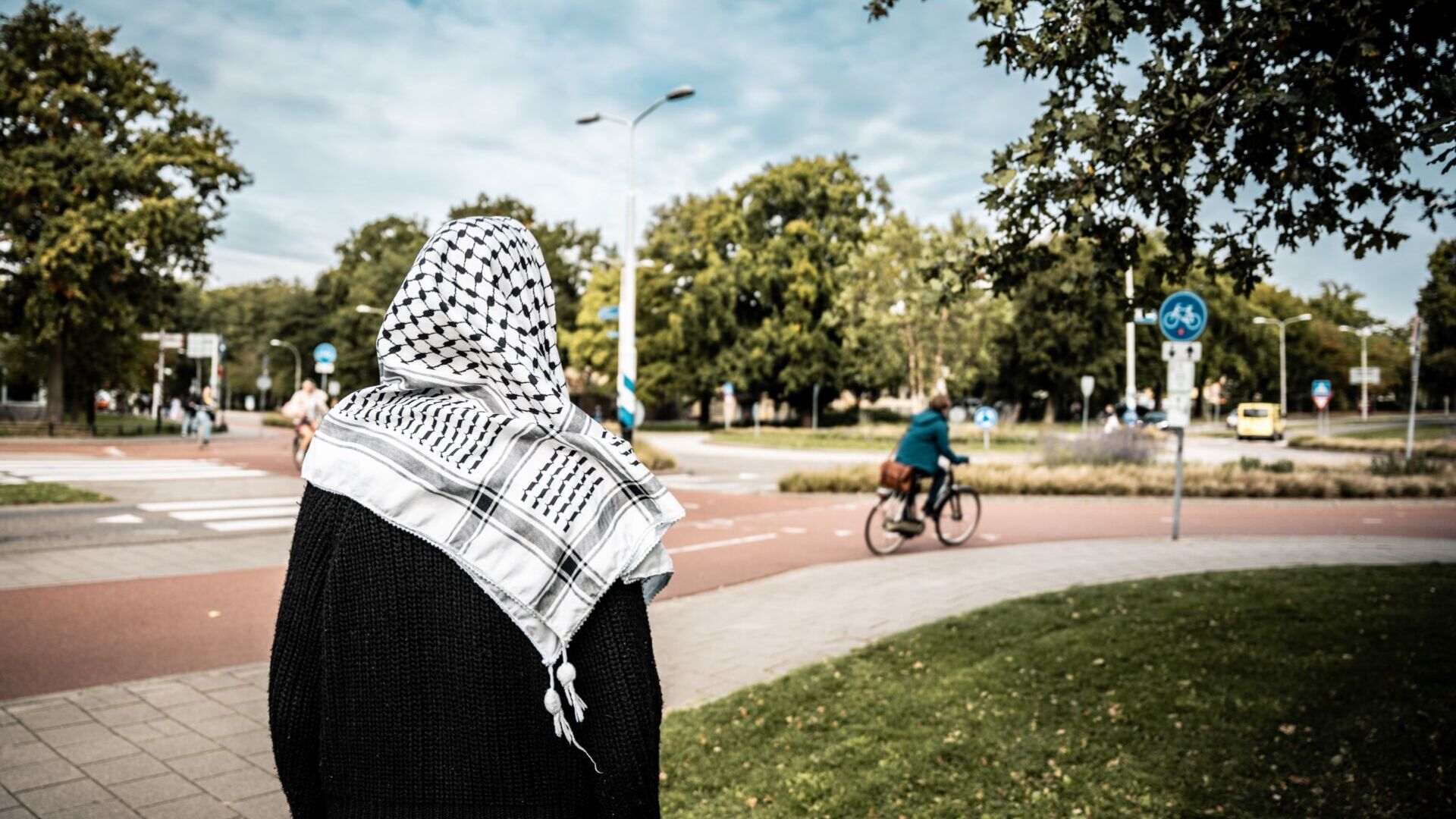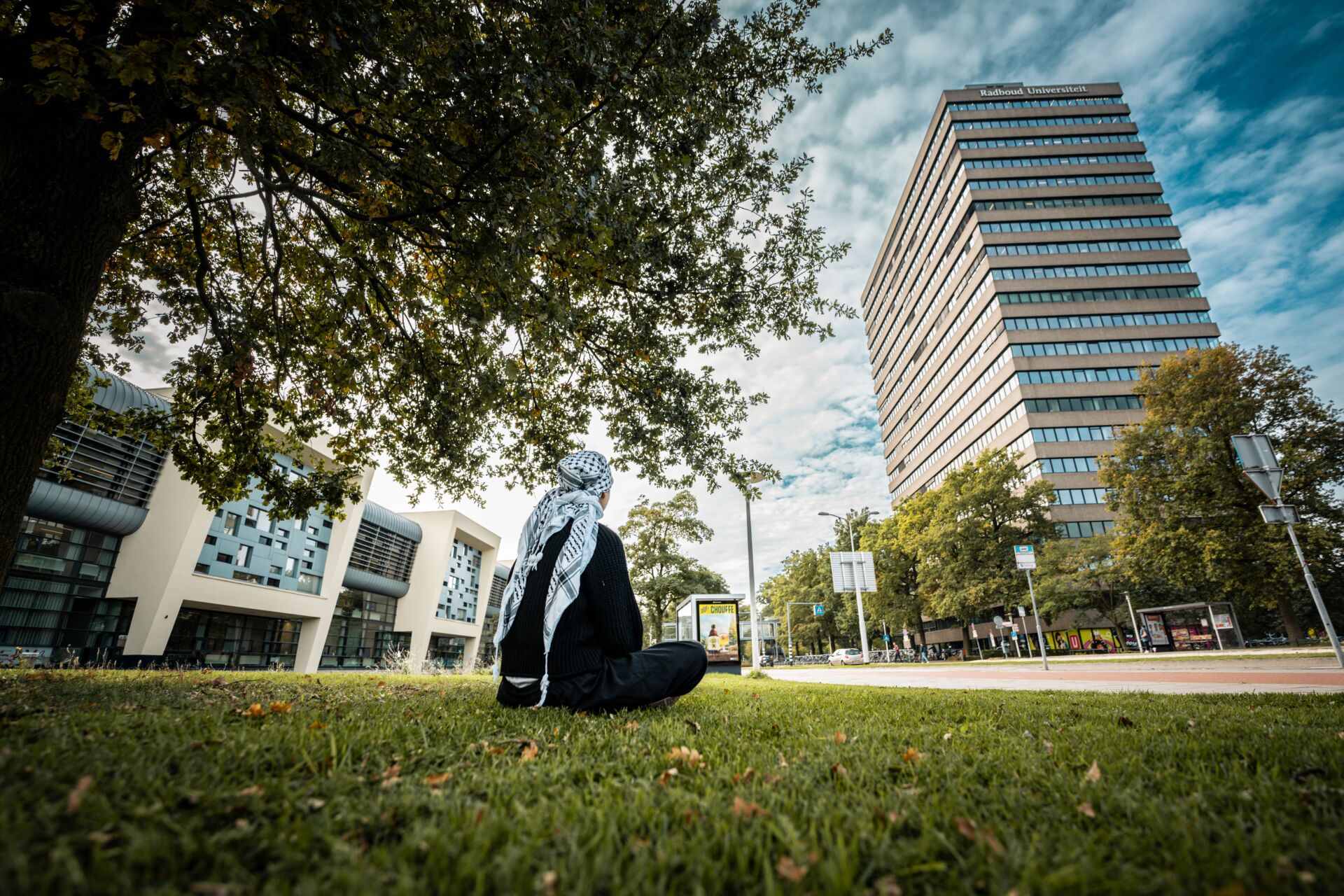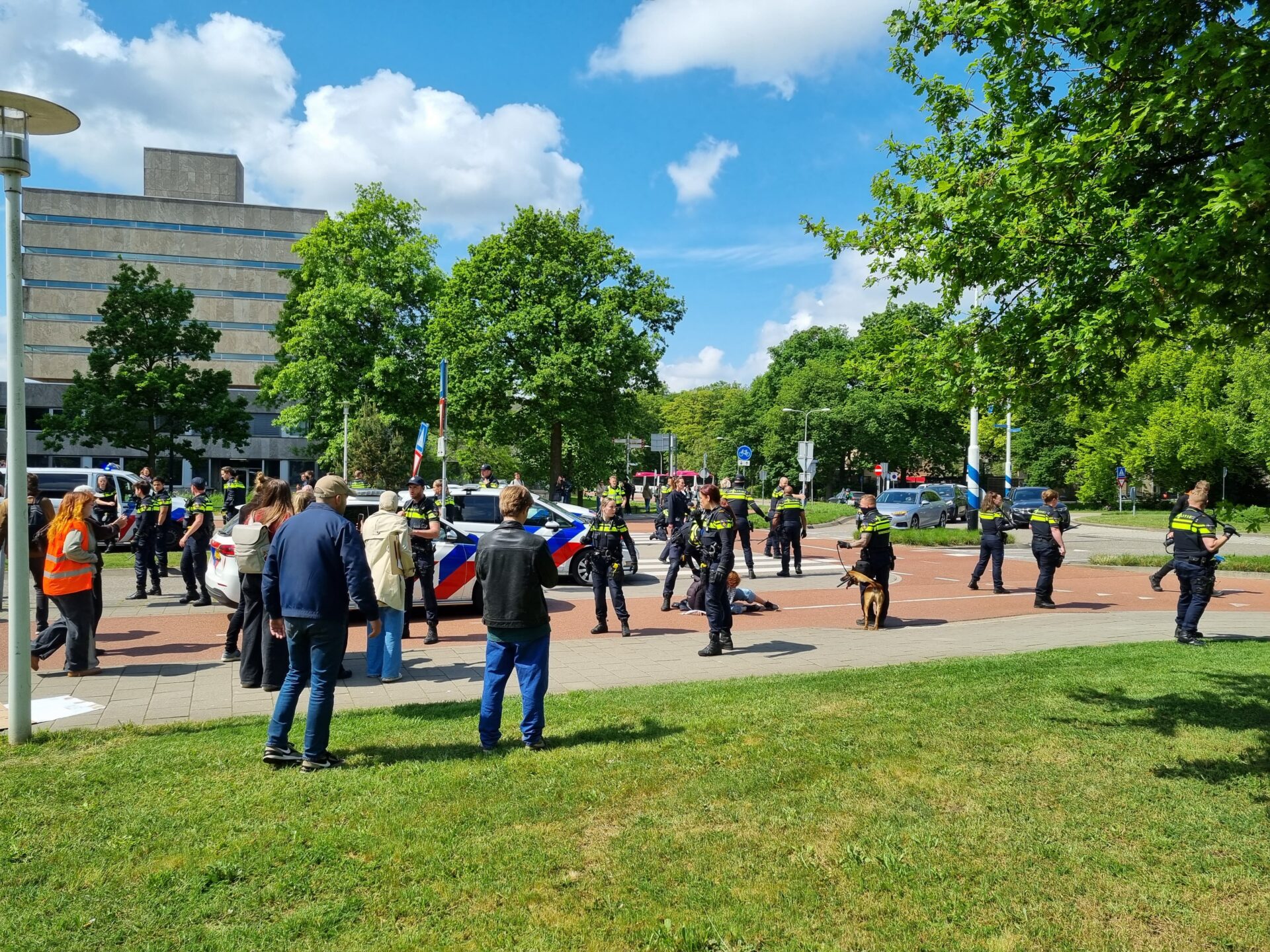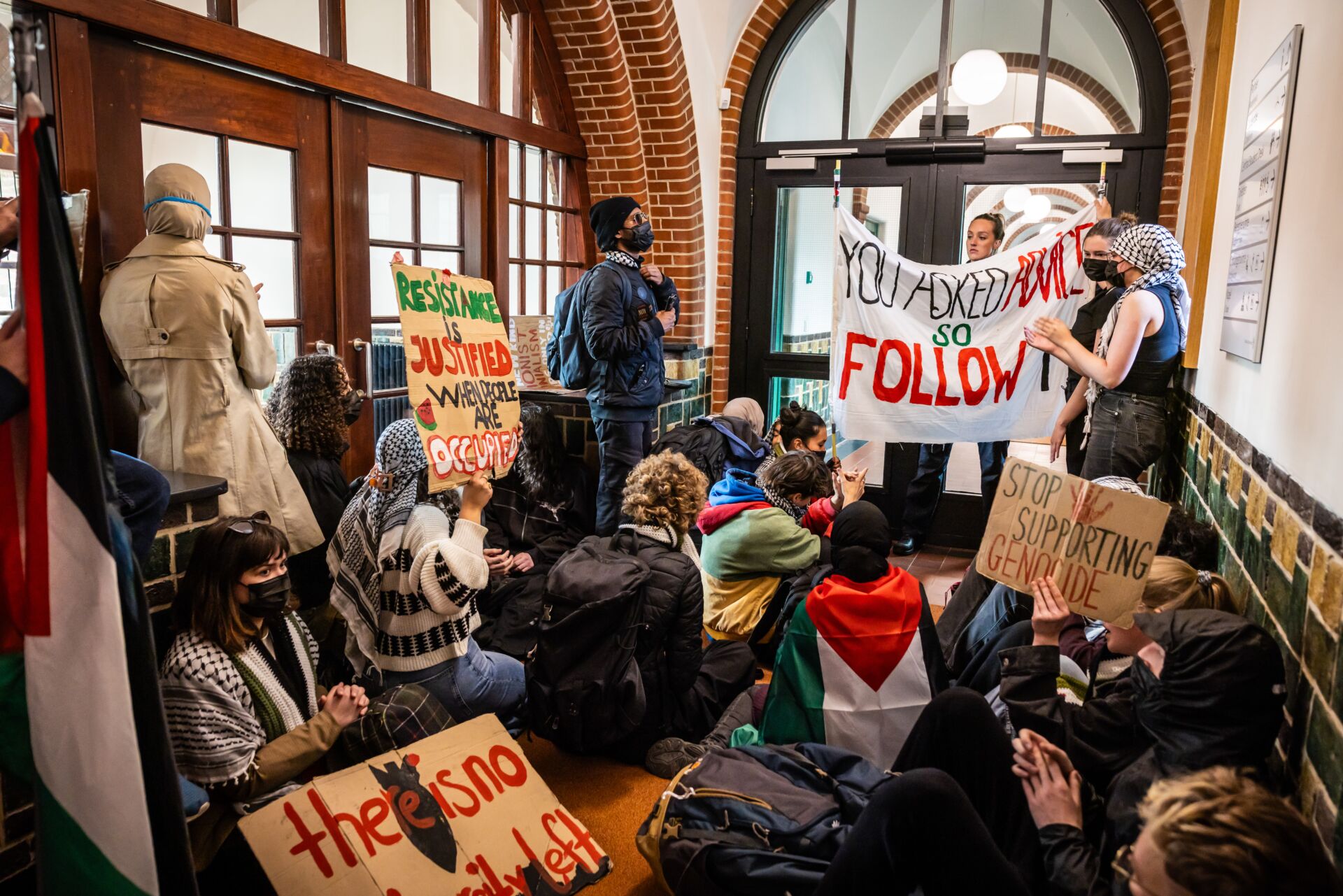Student bitten by police dog tells their story: ‘My leg is permanently disfigured’
-
 De student op de plek waar hen gebeten werd door een politiehond op 7 mei. Foto: Johannes Fiebig
De student op de plek waar hen gebeten werd door een politiehond op 7 mei. Foto: Johannes Fiebig
During the police intervention on campus on May 7, a student was bitten in their right leg by a police dog. In September the student returned to campus with mixed emotions. 'I’m lucky I didn’t lose my leg.'
On May 7th, 2025, shortly after noon, a student is walking along the Heyendaalseweg after a demonstration, when they suddenly feel a sharp pain in the right leg. It takes a few moments before the realisation sets in that a police dog is causing the pain. ‘I begged the police officer to get the dog off me’, the student says seven months and five surgeries later. ‘I don’t know how long it took before the dog actually pulled its teeth out of my leg.’ At least fifteen seconds, according to footage that appeared on social media after the biting incident.
The victim of the dog bite is a student at Radboud University, who had just attended a protest against the university’s ties with Israel. The student has not spoken publicly about the dramatic event which caused great turmoil on and off campus, and about which many questions remain unanswered. At their request, we do not specify any personal information of the students identity and we use the pronouns they/them in this article.
‘It feels unsafe to talk about it. I’m part of the pro-Palestine movement, which faces repression. When I don’t know someone’s stance on the issue, I’d rather stay quiet’, the student explains.
‘It took a few seconds before I understood that a police dog had bitten me from behind’
Sitting at a picnic table behind the Huygens building, the student reflects on the past months. After so many others have spoken about what happened, they are glad to finally tell their own side of the story.
‘I want to emphasise how severely the pro-Palestine movement is being suppressed when police are literally setting dogs on us. In the media and at the university, the focus is often on me as a victim, but not enough attention is paid to the excessive police violence itself. Because of that violence, we can’t safely stand up for our political ideals. What will happen at the next protest? Police dogs were once again deployed during another protest in September. What if someone ends up worse next time?’
Demonstration
The dog bite on May 7 occurred during the arrest of three protesters on campus. The day had started with a protest march organised by the Nijmegen Student Encampment, from Erasmusplein to the Berchmanianum building. Activists were once again urging the university board to cut all ties with Israel.
The student showed up too late and was therefore unable to join the march. University president Alexandra van Huffelen met the group at the entrance of the administration building but ended the conversation when some protesters covered their faces. When she walked inside, a few of them followed.
From outside, it can be seen that there is pushing and pulling going on inside between security guards and demonstrators. Afterwards, both sides accuse each other of using violence. An investigation commissioned by the ombudsperson is expected to clarify what exactly happened soon (see box).
Eventually, the protesters begin a sit-in in the building’s main hall. At that point, the eventual victim joins them. Not long after, the police arrive and announce that everyone must leave the building within ten minutes or face arrest. The group complies with the order and moves toward Erasmusplein, where the demonstration comes to an end.
Investigation into May 7
Accounts of what exactly happened in the Berchmanianum differ. The ombudspersons of Radboud University commissioned Bureau Berenschot to investigate the events leading up to the police intervention. The goal: to prevent a similar incident in the future. ‘We received so many signals that could not be ignored’, ombudsperson Job van Luyken said in a previous interview with Vox.
The investigation focuses specifically on the events on campus that day, up to the moment the police arrive. The actual police intervention, during which the student was bitten, is therefore not part of the investigation.
The results would be shared with the wider universal community this fall. However, this has not happened yet.
By that time, the university has already told the police that the demonstrators in the Berchmanianum used violence. A Vox editor who is present sees staff members pointing someone out. That appears to be the reason why officers continue circling around the demonstrators. They proceed with an arrest after the demonstration ends, while the identified person, along with several others walks along the Heyendaalseweg.
‘We decided to walk back to the city together’, the eventual victim says. ‘We always do that after a protest, because it’s happened before that police detained people afterwards. That’s why we prefer to walk together, we feel safer that way. There were four or five of us, walking arm in arm down the Heyendaalseweg. The police were following us. One of us asked why, but they refused to respond.’
‘Blood everywhere’
Near the roundabout by the Erasmuslaan, the group is surrounded by officers who suddenly appear in front of them. Things then quickly spiral out of control. ‘There was a lot of shouting, but in all the commotion I couldn’t understand what was being said’, the student explains. ‘The group of officers came at us with force. I then felt a sharp pain in my lower right leg.’
‘I didn’t know what was happening at first as I fell to the ground. It took a few seconds before I realised that a police dog had bitten me from behind. While still biting, it dragged me across the pavement.’
The student remembers little after that. After the dog lets go, they are handcuffed and pulled into a police car, unable to walk. On the roundabout, they saw torn fabric and some blood, but it wasn’t until inside the vehicle that the extent of the injury became clear. ‘There was blood everywhere, and pieces of skin. I panicked and kept shouting that I needed medical help. It’s gruesome to say, but I saw pieces of fat tissue dripping from my leg onto the floor of the police car.’

At first, the officers don’t respond. The car even drives past the hospital. The student keeps repeating that they need medical care. When a officer finally shines a flashlight on the student’s leg, the car immediately turns around and heads to Radboudumc.
‘The hours in the hospital are a blur. I lay there for two or three hours in panic, waiting for surgery. I was terrified I’d lose my leg since I couldn’t move it. Because I was under arrest, an officer was present in the hallway. After several hours, I was told the arrest had been lifted.’ The student doesn’t know the initial reason for their arrest, or why it was dropped, they say.
‘I was lucky that no nerves or bones were damaged. Some muscles were completely torn by the bite and had to grow back’
During surgery at the hospital, a drain is placed in the student’s leg to prevent infection. The student has to stay in the hospital for two weeks. At the table behind the FNWI building, they become emotional. Talking about it isn’t always easy, they apologise.
‘My leg is permanently disfigured. I had three deep bite wounds and underwent five surgeries, four under full anaesthesia. The wound was too large to stitch, so they took a piece of skin from my thigh for a graft, leaving scars there too.’
‘The recovery took about five months. I have had my final session with the physical therapist. I was lucky that no nerves or bones were damaged. Some muscles were completely torn by the bite and had to grow back. This could have ended much worse – I could have lost my leg.’
‘Haven’t heard back’
Many staff members and students witnessed the arrests as bystanders or saw the footage afterward. A photo of the deep flesh wound circulated on social media and on flyers distributed around campus after the incident.
On May 19, a large group of staff members and the student union AKKU demanded the university board’s resignation for failing to issue an apology after the incident. The board did express their regret. The participation council later criticized the university administration for its lack of self-reflection. The ombudsperson hired Bureau Berenschot to investigate the events leading up to the police intervention (see box). The Rijksrecherche (National Police Internal Investigations Department) also launched an investigation into whether the dog’s use was justified.

Physically, things may be improving, but mentally the student is still not the same. They are receiving psychological support. ‘Since September, I’ve been back on campus to attend classes. But it feels very uncomfortable to pass by the roundabout. I still don’t understand how this could have happened, and why so much violence was necessary. Why were the police there, why was the dog there?’
‘There is a genocide happening in Gaza, and the only proper response is to protest’
The student has shared their story before with friends, the ombudsperson, and the investigators of the Rijksrecherche. ‘I’ve felt a lot of support from students and staff. The university board sent me a card while I was in the hospital expressing sympathy, but an apology or offer of help never came. They invited me for a meeting, but I haven’t accepted it so far. It feels orchestrated on their part, and the idea of such a conversation makes me feel anxious.’
The student doesn’t know the current status of the national investigation. Since the interview, they have not heard back. When asked about the investigation, the police let’s Vox know to ask the Rijksrecherche. The public prosecutor’s office for East Netherlands told Vox it cannot comment on the case until the investigation is complete, at which point the findings will be made public.
Looking back on the events of May 7, the student says they have no regrets about being at the protest. ‘I stand by my ideals, and I believe I have the right to demonstrate for them. There is a genocide happening in Gaza, and the only proper response is to protest. The violence we face at demonstrations is nothing compared to the daily violence people in Gaza endure. If there is another demonstration, I plan to make my voice heard again. I won’t feel comfortable, but I will be there.’




